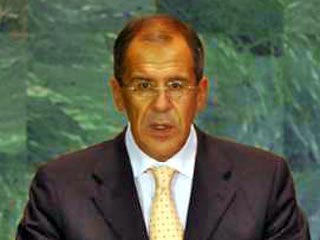Russian Foreign Minister: on the matters of "double standards"
 Russian Foreign Minister Sergey Lavrov attempted to set things straight with Brits on no man's land
Russian Foreign Minister Sergey Lavrov attempted to set things straight with Brits on no man's land
During his speech to the UN General Assembly on Thursday, Russian Minister of Foreign affairs Sergey Lavrov addressed the issue of terrorism.
According to an earlier statement made by the Ministry of Foreign Affairs, Moscow has come up with several initiatives, at the heart of which lies the idea of solidarity before a terrorist threat. Russia in turn provides the United Nations with the leading role in this process.
Lavrov's address was mainly influenced by his earlier report at the Association of the American internal politics. There, he had made the following statement: “Humanity has confronted the most serious and dangerous threat since the times of the WWII.” “The wave of terror that has flooded the world and especially the most recent tragedy in the Russian town of Beslan, is indicative of the fact that international terrorism pose a challenge to the humanity at large,” said Lavrov. “Habits inherited since the times of the Cold War to divide terrorists into groups of “one's own” and “foreign”, “good” and “bad” have to be left behind once and for all,” emphasized Russian Foreign Minister.
At the same time, he attempted to destroy the illusion of many Western experts as though Russia deviates from the democratic values. “President Vladimir Putin has stated unambiguously that Russia will remain a democratic state. It is only as such that we see an opportunity to rank high in the forming system of foreign affairs,” stated Lavrov.
In the course of the past several weeks, Lavrov has been talking about “One's own” and “foreign”, “good” and “bad” terrorists. This phrase is particularly aimed at the US and Great Britain, both of which Russian Ministry of Foreign affairs accuses of “double standards”.
The reason is such that both of these countries have Chechen emissaries living on their territories, who in turn are wanted by Russian authorities. After the Beslan tragedy Moscow has asked for the extradition of Ilyas Akhmadov and Akhmed Zakaev, reported a source in the Ministry. In this regard, Sergey Lavrov's private meeting with his British colleague Jack Stro (which took place September 22, 2004 in New York) could not be labeled as a mere formality. Stro along with the new British Ambassador to Moscow A. Brenton faces the issue of extradition of one of the Chechen emissaries. In the meantime, the Brits demand Russian authorities to present additional evidences proving Zakaev’s connection to terrorism. According to a spokesman of the British Ministry of Foreign Affairs, London’s position in regards to Zakaev will remain unchangeable.
Such negotiations between Moscow and London are quite significant. Putin's major vis-а-vis in Europe: Gerhard Schroeder, Jacques Chirac and Silvio Berlusconi, despite public criticism of Kremlin's Caucasian politics, prefer to stay away, refrain from interfering with the head of the Russian State. George Bush chose similar tactic. His is despite the fact that majority of those from the American establishment do not share Bush's sympathies to Putin.
British Prime Minister Tony Blair, whose popularity seems to be decreasing in his own country quite rapidly, wants to play it safe with the British public opinion concerning the topic of Chechnya. Thus, Great Britain has turned out to be the only Western nation subjecting Moscow to political “isolation.” Blair is the only one among influential European leaders who has not visited Russia after president Putin's reelection.
English public still cannot agree on Moscow's urge to fight terrorism.
One of the most respectful editions “The Financial Times” wrote the following: “Who can take the government which is willing to fight a bloody war against its own citizens in Chechnya seriously?” “People, willing to support Jihadists, have to regard them as greater and lesser evils. A tight alliance with Putin’s Russia could lead right to the opposite,” reports the newspaper.
“Independent” in turn got interested in what was meant by the word “terrorist”. “Two weeks ago, -writes the newspaper, -Chechen Jihadists murdered more than 300 children in Beslan. They were “terrorists”. Since 1991, Russian military men have killed more than 40 000 Chechen children. However, they are not “terrorists”; they are “our allies”.
The idea behind such comparison is obvious: the British press basically accuses Moscow of criminal acts.
Yulia Petrovskaya
Subscribe to Pravda.Ru Telegram channel, Facebook, RSS!





